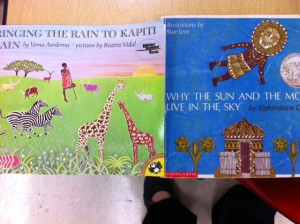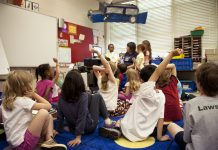Last week I volunteered for a few hours in my daughter’s kindergarten class in Berkeley, California. I loved this glimpse of multiculturalism at work in her class that I witnessed.
Scene: I am sitting at a table with Chu-hee, Amir, Zaire and Rihanna. They are practicing writing “I like to” and gluing a picture of what they like.
Zaire asks me as he glues, “Who lives in your house?”
Me: Me, Jasmin, Lila and their Baba. (I realized after the fact that I should have said that with proper grammar-I obviously wouldn’t make the best teacher.)
Zaire: Baba? Who’s that?
Me: That’s the Dad. Baba is Dad in Arabic.
They were all quiet for a second. I wondered if they even knew what Arabic was. I had a fleeting moment where I pondered if I should have just used the word “Dad” instead of “Baba.” I notice at school Jasmin always uses “Daddy” when referring to her dad, as she has already made the distinction that “Daddy” is what everyone says whereas “Baba” is not a word everyone understands or uses. Then the silence was broken with something unexpected.
Chu-Hee: I speak Korean!
Me: How do you say Dad in Korean?
Chu-Hee: Appa
Amir: I speak Spanish!
Me: How do you call your Dad in Spanish?
Amir: Papa
Zaire to Chu-Hee: You speak Chinese, not Korean.
Chu-Hee, Amir and Rihanna: NOOOO! She speaks Korean!
I loved how they all rallied to correct Zaire. Then everyone at the table went around and told me how they called their “Mom,” before switching back to “I like to” sentences. Sharing languages, learning new words and correcting misperceptions all tucked into less than three minutes of a routine kindergarten morning. That is multiculturalism in practice with five-year-olds, I thought. And it makes me so happy my daughter gets to experience this as her norm from a young age.
I also came across these two books in their class, and was thrilled to see these along with other multicultural books on display.





































What a great moment you got to share and so lovely that your daughter gets to experience that diversity from such a young age.
Thanks for the comment! It was pretty cool to be in her class and I feel very lucky to live where we do because of how diverse it is.
What an amazing experience! My daughter was able to differentiate Russian, English and Chinese since she started speaking. She mostly speaks English and now started speaking Chinese, but Russian will only speak when she wants something ha ha It’s so adorable when children are able to understand there are different languages!
[…] Berkeley is a diverse city in regards to not just race and ethnicity but also class. It has both extreme wealth (I have met more people on Berkeley than anywhere else before that don’t have to work because of their wealth) as well as high poverty. About 50% of the kids at my daughters’ school receive free lunches. Berkeley uses address as only one of three factors in its public school assignment process. Race, parent education level and income (evidenced by address) all factor into school assignments. This ensures each class is balanced by not just race but also class and finally education level. Parents put their top three school choices (out of four possible schools in your zone) but the lottery system, based on these factors, determines your ultimate assignment. […]